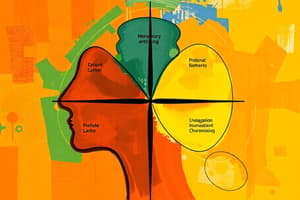Podcast
Questions and Answers
What is the term for the tendency of a person to enjoy being with others and engage in social activities?
What is the term for the tendency of a person to enjoy being with others and engage in social activities?
- Extraversion (correct)
- Introversion
- Emotional stability
- Agreeableness
Which dimension of personality describes a person's self-confidence and emotional control?
Which dimension of personality describes a person's self-confidence and emotional control?
- Emotional stability (correct)
- Conscientiousness
- Openness to experience
- Agreeableness
Which of the following best describes individuals high in conscientiousness?
Which of the following best describes individuals high in conscientiousness?
- Sociable and energetic
- Reserved and introspective
- Irresponsible and lazy
- Dependable and achievement-oriented (correct)
People who are warm, friendly, and eager to help others are said to have high levels of which personality trait?
People who are warm, friendly, and eager to help others are said to have high levels of which personality trait?
What dimension of personality is described as the degree to which a person is open to new experiences?
What dimension of personality is described as the degree to which a person is open to new experiences?
Which personality trait is typically associated with self-doubt and depression in individuals?
Which personality trait is typically associated with self-doubt and depression in individuals?
An individual who avoids social situations and prefers solitude is likely exhibiting what trait?
An individual who avoids social situations and prefers solitude is likely exhibiting what trait?
Which of the following best describes individuals who are high in emotional stability?
Which of the following best describes individuals who are high in emotional stability?
Flashcards
Personality
Personality
Relatively stable set of psychological traits influencing how someone interacts with others, feels, thinks, and behaves. It summarizes an individual's style of dealing with people, situations, and problems.
Extraversion
Extraversion
One of the five fundamental dimensions of personality, describing how outgoing and sociable a person is. High scorers enjoy social situations, while low scorers prefer solitude.
Emotional Stability
Emotional Stability
One of the five fundamental dimensions of personality, describing how emotionally stable and balanced a person is. High scorers are self-confident and have high self-esteem, while low scorers tend to be anxious and prone to depression.
Agreeableness
Agreeableness
Signup and view all the flashcards
Conscientiousness
Conscientiousness
Signup and view all the flashcards
Openness to experience
Openness to experience
Signup and view all the flashcards
Five-Factor Model of Personality (FFM)
Five-Factor Model of Personality (FFM)
Signup and view all the flashcards
Introverts
Introverts
Signup and view all the flashcards
Study Notes
Personality and Learning
- Behavior is influenced by personality
- Personality is a stable set of psychological characteristics
- Personality influences how individuals interact with others
- Personality affects how individuals think, feel, and behave
- Personality reflects a person's style of dealing with others, situations, and problems
The Five-Factor Model (FFM)
- People have unique and complex personalities
- The FFM outlines five basic dimensions of personality
- Extraversion/Introversion: The degree to which a person is outgoing and enjoys being with others versus being shy
- Emotional Stability: The degree to which a person has appropriate emotional control. High emotional stability leads to self-confidence and high self-esteem, whereas low stability leads to self-doubt and depression
- Agreeableness: The degree to which a person is friendly and approachable. More agreeable people are warm, considerate, friendly, cooperative, and eager to help others
- Conscientiousness: The degree to which a person is responsible and achievement-oriented. More conscientious people are dependable and positively motivated, while less conscientious people are irresponsible and lazy
- Openness to Experience: The degree to which a person thinks flexibly, is receptive to new ideas, and accepts others' opinions, even if differing from their own. More open people tend to be creative and innovative, while less open people favor the status quo
Extraverts vs. Introverts
- Extraversion: The extent to which a person is outgoing and enjoys being with others (sociable)
- Introversion: The extent to which a person enjoys being alone
- High extraverts enjoy social situations, while introverts avoid them
Emotional Stability
- Emotional stability: The degree to which a person has appropriate emotional control
- People with high emotional stability are self-confident and have high self-esteem
- People with low emotional stability tend toward self-doubt and depression
Agreeableness
- Agreeableness: The degree to which a person is friendly and approachable
- More agreeable people are warm, considerate, friendly, cooperative, and eager to help others
Conscientiousness
- Conscientiousness: The degree to which a person is responsible and achievement-oriented
- More conscientious people are dependable and positively motivated
- Less conscientious individuals are irresponsible and lazy
Openness to Experience
- Openness to Experience: The extent to which a person is receptive to new ideas and accepting of others' opinions, even those differing from their own.
- More open people tend to be creative, innovative
- Less open people favor the status quo
The Big Five Dimensions
- The Big Five dimensions are relatively independent
- Individuals can be high or low in any combination of dimensions
- The dimensions hold up well across cultures
Studying That Suits You
Use AI to generate personalized quizzes and flashcards to suit your learning preferences.




